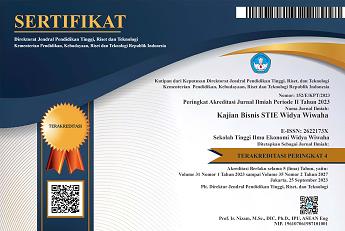PENGARUH KONVERGENSI INTERNATIONAL FINANCIAL REPORTING STANDARDS (IFRS) TERHADAP PENGHINDARAN PAJAK(TAX AVOIDANCE)
Studi Kasus Pada Perusahaan Jasa Transportasi yang Terdaftar di BEI
DOI:
https://doi.org/10.32477/jkb.v26i2.110Keywords:
tax avoidance, IFRS, Cash Efective Tax Rate (CETR), CSR, size, earning management (EM)Abstract
This research aimed to examine the effect of the convergence of International Financial Reporting Standards (IFRS) on tax avoidance on companies listed in Indonesia Stock Exchange. Tax avoidance that used in this research was Cash Efective Tax Rate (CETR). This research is also use the control variable to get other different influence that different such as CSR, size, and earning management (EM. This research used populations sector of transport service companies that listed in Indonesia Stock Exchange. The data of this research taken from secondary data that was from the Indonesia Stock Exchange in the form of Indonesian Capital Market Directory (ICMD) and the annual report of the company 2011-2015. The method of collecting sample was purposive sampling technique, the population that to be sampling in this research was populations that has the criteria of a particular sample. Companies that has the criteria of the research sample as many as 78 companies. The method of analysis used in this research is multiple regression analysis. Based on regression testing shows that the convergence of International Financial Reporting Standards (IFRS) has a positive and significant impact on tax evasion. This shows that IFRS convergence actually improves tax evasion practices. The control variables of firm size and earnings management also significantly influence the application of IFRS in improving tax avoidance practices, while CSR control variables have no role in convergence IFRS in improving tax evasion practice.
Downloads
References
Amidu, Mohammed, Sally Mingle Yorke, dan Simon Harvey (2016), The Effects of Financial Reporting Standards on Tax Avoidance and Earnings Quality: A Case of an Emerging Economy, Journal of Accounting and Finance Vol. 16(2).
Astuti, Titiek Puji dan Y. Anni Aryani (2016), “Tren Penghindaran Pajak Perusahaan Manufaktur di Indonesia yang Terdaftar Di BEI Tahun 2001-2014”, Jurnal Akuntansi/Volume XX, No. 03, September: 375-388.
Ball, R (2006), International Financial Reporting Standards (IFRS): Pros and Cons for Investors, Accounting and Business Research, 36: 5-27.
Budi S., Prianto dan Eko Suwardi (2013), Konvergensi IFRS dan Pengaruhnya terhadap Perpajakan, Tesis Program Studi Magister Manajemen UGM. Tidak diterbitkan.
Braga, Renata Nogueira (2017), Effects of IFRS adoption on tax avoidance. Article presented at the XVI International Conference in Accounting, São Paulo, SP, Brazil, July. ISSN 1808-057X
Dyreng, S.D. et all (2008), Long-run Corporate Tax Avoidance, The Accounting Review, 83 (1), 61-68
Famila, M.Ayub (2012), Perbandingan Kualitas Laba Antara Periode Sebelum dan Seteleh Pengadopsian IFRS di Indonesia, Skripsi Jurusan Akuntansi FEB Universitas Indonesia: Tidak diterbitkan
Ikatan Akuntan Indonesia (2007), Peluncuran program Konvergensi PSAK terhadap IFRS: http://www.iaiglobal.or.id/berita/ detail.php?catid=&id=19 . Diakses pada 27 Desember 2014
Ikatan Akuntan Indonesia (2009), Pernyataan Standar Akuntansi Keuangan No. 1 (Revisi 2009): Penyajian Laporan Keuangan (Softcopy Edition), Jakarta.
Tribunnews.com (2017), “Indonesia Masuk Peringkat ke-11 Penghindaran Pajak, Perusahaan Jepang No.3”. https:// www. k a s k u s . c o . i d / t h r e a d / 5a12e3b3dbd7702a368b4588/ indonesia-masuk-peringkat-ke-11 penghindaran -pajak-perusahaanjepang- no3/. Diakses 04April 2018.
Isroah (2013), Perpajakan. Badan Pengelolaan dan Pengembangan Usaha (BPPU) Universitas Negeri Yogyakarta
Krismiaji, Y., Anni Aryani, dan Djoko Suhardjanto (2013), “Pengaruh Adopsi International Financial Reporting Standards terhadap Kualitas Informasi Akuntansi”, Jurnal Akuntansi & Manajemen, Vol. 24, No. 2
Lestari, Atik (2015), Dampak International Financial Reporting Standards (IFRS) Terhadap Penghindaran Pajak (Tax Avoidance), Skripsi Program Studi Akuntansi FE Universitas Islam Sultan Agung: Tidak diterbitkan.
Mardiasmo (2011), Perpajakan, Edisi Revisi”, Yogyakarta: Andi.
Martani, Dwi (2011), Dampak Implementasi IFRS Bagi Perusahaan, Jurnal Akuntansi Keuangan ISSN 2088-8317/ No. 48 tahun V Juli 2011, hal. 98-99
Natalia, Irene (2010), Kualitas Laba yang Dihasilkan Oleh Pengadopsian International Financial Reporting Standards. Jurnal Akuntansi Kontemporer, Januari, Vol. 2 No.1
Prakosa, Kesit Bambang (2014), Pengaruh Profitabilitas, Kepemilikan Keluarga dan Corporate Governance Terhadap Penghindaran Pajak Di Indonesia, Simposium Nasional Akuntansi.
Priantara, D (2011), Kupas Tuntas pengawasan, pemeriksanaan dan penyidikan pajak. Jakarta: Indeks.
Rachmatika, Andita Dwi (2016), Pengaruh Konvergensi IFRS Terhadap Penghindaran Pajak (Tax Avoidance) Pada Perusahaan Manufaktur yang Terdaftar di BEI, Skripsi Jurusan Akuntansi Universitas Airlangga, Tidak diterbitkan.
Sianipar, Glory Augusta EM dan Marsono (2013), Analisis Komparasi Kualitas Informasi Akuntansi Sebelum dan Sesudah Pengadopsian Penuh IFRS di Indonesia, Diponegoro Journal of Accounting, Vol. 2, No. 3, Hal. 1-11
Soemitro, Rochmat. Azaz dan Dasar Perpajakan. Badnung:Eresco. 1990:5.
Susilo, Joko, Muhammad Saifi, dan Devi Farah Azizah (2016), Analisis Implementasi PSAK 13 dan Dampaknya Pada Beban Pajak Penghasilan Perusahaan. Jurnal Perpajakan (JEJAK), Vol. 8, No. 1
Zain, Mohammad (2007), Manajemen Perpajakan, edisi 3. Jakarta: Salemba Empat.









